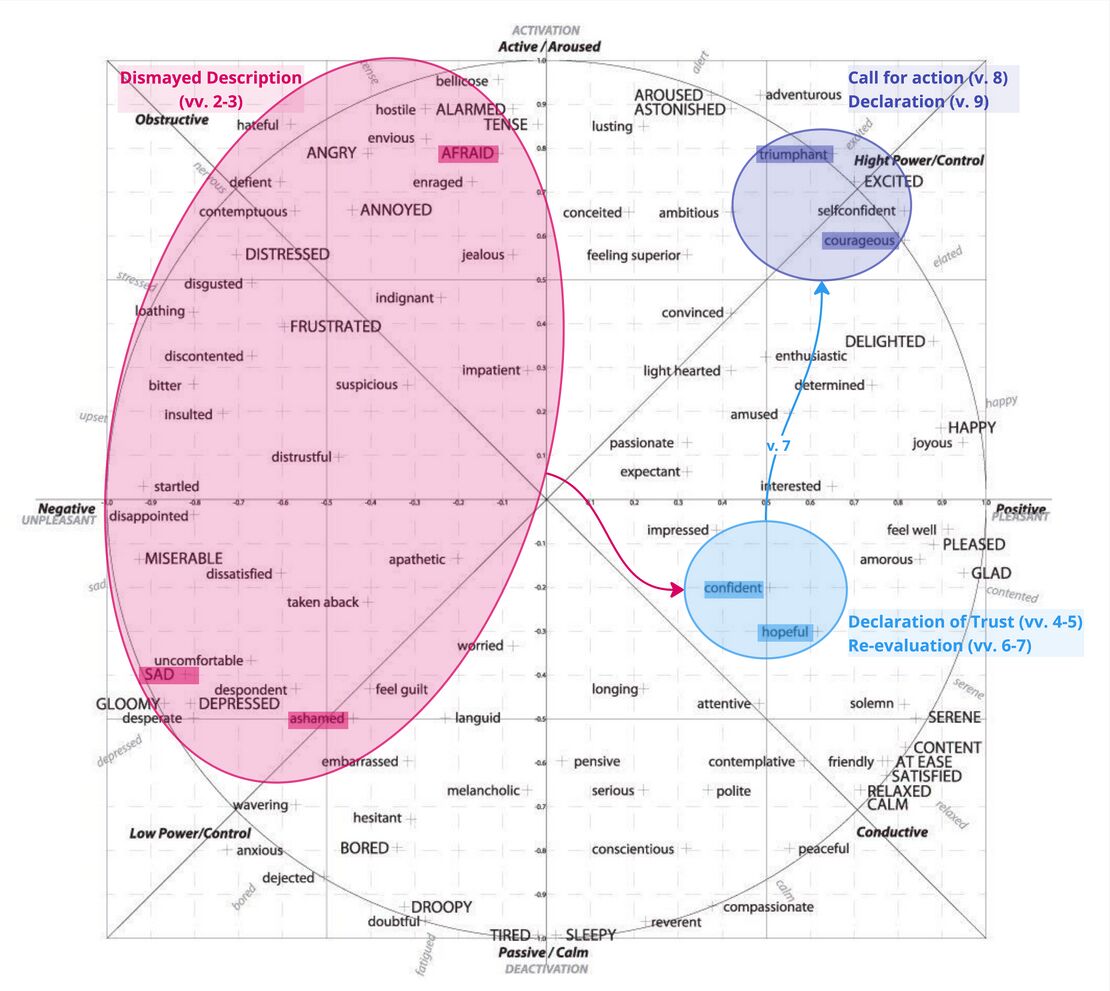Psalm 3 Emotional
From Psalms: Layer by Layer
Psalm 3/Emotional
Choose a PsalmNavigate Psalm 3
Emotional Analysis
This layer explores the emotional dimension of the biblical text and seeks to uncover the clues within the text itself that are part of the communicative intent of its author. The goal of this analysis is to chart the basic emotional tone and/or progression of the psalm.
For a detailed explanation of our method, see the Emotional Analysis Creator Guidelines.
Emotional Analysis Chart
If an emendation or revocalization is preferred, that emendation or revocalization will be marked in the Hebrew text of all the visuals.
| Emendations/Revocalizations legend | |
|---|---|
| *Emended text* | Emended text, text in which the consonants differ from the consonants of the Masoretic text, is indicated by blue asterisks on either side of the emendation. |
| *Revocalized text* | Revocalized text, text in which only the vowels differ from the vowels of the Masoretic text, is indicated by purple asterisks on either side of the revocalization. |
| Verse | Text (Hebrew) | Text (CBC) | The Psalmist Feels | Emotional Analysis Notes |
|---|---|---|---|---|
| 1 | מִזְמ֥וֹר לְדָוִ֑ד בְּ֝בָרְח֗וֹ מִפְּנֵ֤י ׀ אַבְשָׁל֬וֹם בְּנֽוֹ׃ | A psalm. By David. When he was fleeing from Absalom, his son. | ||
| 2 | יְ֭הוָה מָֽה־רַבּ֣וּ צָרָ֑י | YHWH, how my adversaries have become many! | • David is dismayed at the vast number of his enemies • David is sad and ashamed, having been forced by his own son to leave Jerusalem • v. 3b: the psalmist's enemies feel triumph at David's imminent defeat |
• dismay: sudden loss of courage or resolution from alarm or fear (Merriam-Webster); cf. the Hebrew word נבהל/בהלה: state in which humans experience a great fear combined with severe distress (SDBH) • Note especially the repetition and fronting of many (vv. 2-3), implying a sense of overwhelming fear; also note the exclamative מָה—how many...! • The narrative in 2 Samuel 15ff also implies sadness and mourning, at least upon leaving Jerusalem: But David continued up the Mount of Olives, weeping as he went; his head was covered and he was barefoot... (2 Sam 15:30, NIV). • Verse 4 (my honor and the one who lifts my head) implies that David has lost his honor and is experiencing shame. |
| רַ֝בִּ֗ים קָמִ֥ים עָלָֽי׃ | Many are those rising against me. | |||
| 3 | רַבִּים֮ אֹמְרִ֪ים לְנַ֫פְשִׁ֥י | Many are those saying about me, | ||
| אֵ֤ין יְֽשׁוּעָ֓תָה לּ֬וֹ בֵֽאלֹהִ֬ים סֶֽלָה׃ | There is no victory for him in God! Selah. | |||
| 4 | וְאַתָּ֣ה יְ֭הוָה מָגֵ֣ן בַּעֲדִ֑י | But you, YHWH, are a shield for me, | • David is confident in YHWH and hopeful for the victory that he gives | |
| כְּ֝בוֹדִ֗י וּמֵרִ֥ים רֹאשִֽׁי׃ | my honor, and the one who lifts my head. | |||
| 5 | ק֭וֹלִי אֶל־יְהוָ֣ה אֶקְרָ֑א | I call aloud to YHWH, | ||
| וַיַּֽעֲנֵ֨נִי מֵהַ֖ר קָדְשׁ֣וֹ סֶֽלָה׃ | and he answers me from his holy mountain. Selah. | |||
| 6 | אֲנִ֥י שָׁכַ֗בְתִּי וָֽאִ֫ישָׁ֥נָה | I lay down and fell asleep. | ||
| הֱקִיצ֑וֹתִי כִּ֖י יְהוָ֣ה יִסְמְכֵֽנִי׃ | I woke up, because YHWH supports me. | |||
| 7 | לֹֽא־אִ֭ירָא מֵרִבְב֥וֹת עָ֑ם | I will not be afraid of tens of thousands of people, | • The clearest emotional statement in the psalm is I will not be afraid (לֹֽא־אִירָא—state in which humans experience fear [SDBH]). This implies that the emotional tone of this section is the opposite of fear, i.e., confidence (Hebrew: בטח). It further implies that the emotional tone of vv. 2-3 is one of fear or dismay. | |
| אֲשֶׁ֥ר סָ֝בִ֗יב שָׁ֣תוּ עָלָֽי׃ | who have taken position against me all around. | |||
| 8 | ק֘וּמָ֤ה יְהוָ֨ה ׀ הוֹשִׁ֘יעֵ֤נִי אֱלֹהַ֗י | Rise up, YHWH! Save me, my God! | • David is confident in YHWH and hopeful for the victory that he gives • David is courageous in the face of many enemies • David is triumphant because his victory is guaranteed |
• The tightly clustered imperatives and vocatives in v. 8a (Rise up, YHWH! Save me, my God!), together with the highly graphic imagery in v. 8bc (strike on the jaw... break teeth), implies an increase in emotional intensity. Thus, the statement at the end of v. 7b—I will not be afraid...!—launches the psalmist into a state of even greater confidence, even triumph or courage. The declarations in v. 9 (Victory is YHWH's!) also suggest a triumphant tone. |
| כִּֽי־הִכִּ֣יתָ אֶת־כָּל־אֹיְבַ֣י לֶ֑חִי | For you have struck all my enemies on the jaw. | |||
| שִׁנֵּ֖י רְשָׁעִ֣ים שִׁבַּֽרְתָּ׃ | You have broken wicked people's teeth. | |||
| 9 | לַיהוָ֥ה הַיְשׁוּעָ֑ה | Victory is YHWH's! | ||
| עַֽל־עַמְּךָ֖ בִרְכָתֶ֣ךָ סֶּֽלָה׃ | Your blessing is on your people. Selah. |
Affective Circumplex
The affective circumplex locates emotions on two axes: (1) positive vs. negative valence; and (2) active vs. passive activation. Since emotional terminology often carries unintended cultural connotations, the purpose of the circumplex is to ease translation of emotions across different languages and cultures.


